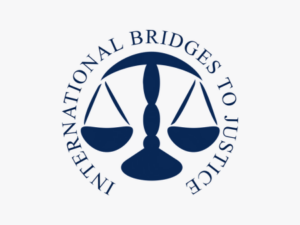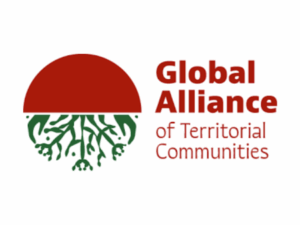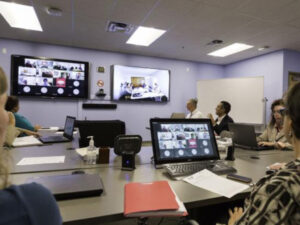Panorama Global supports changemakers working on a wide range of social issues by facilitating collaborations.
Gabrielle Fitzgerald of Panorama Global spoke with Erica J. Edwards on February 23, 2023. Click here to read the full conversation with insights highlighted.
Erica Edwards: Could you introduce yourself and describe the problem you’re addressing and how you’re responding to it?
Gabrielle Fitzgerald: Hi, I’m Gabrielle Fitzgerald. I work for Panorama here in Seattle. I describe Panorama as a platform for social change. Therefore, unlike many organizations, we’re not focused on just a single issue. We’re looking at what services we can provide to enable others to work across a wide range of social change issues. We’re about supporting social change broadly as opposed to any specific individual issue.
Erica Edwards: Tell me a little bit more about who Panorama works with, and what kind of service do you provide to cultivate that change that you’re speaking of, that broad change?
Gabrielle Fitzgerald: Panorama works with organizations and individuals from a wide variety of sectors — philanthropy, nonprofits, social entrepreneurs, and also the private sector and multinational organizations. Really, we work with anyone who wants to create social change.
Erica Edwards: Who are the people you’re servicing and how do you engage with them?
Gabrielle Fitzgerald: As I mentioned, we work on a wide variety of issues. One example is we work on trying to get to gender parity in elected office here in the US. We work with organizations that are training more women to run for office, and we’re thrilled that 11% more women have been elected in the time that we’ve been working on this. We also have a fund where we provide funding to organizations that are working to provide mental health services to adolescents of color and LGBTQ+ youth. In that case, we are providing philanthropic dollars, but the ultimate beneficiaries are people in need of mental health care in those populations.
Erica Edwards: What makes your approach distinctive?
Gabrielle Fitzgerald: I think what’s unique about Panorama is that we’re not focused on a single issue or a single solution. We recognize that there are many problems in this world and there’s a lot that can be done. There’s a lot of common strategies that can be used to accelerate the pace of change. We try to bring our knowledge of how to create a coalition, how to create a donor collaborative or a learning community, and bring that to a wide range of issues through our partnerships with philanthropists, social impact leaders, and nonprofit leaders.
Erica Edwards: Can you share an example that illustrates the impact of your work?
Gabrielle Fitzgerald: Panorama, as I’ve mentioned, works across a wide range of issues, so we have a pretty wide range of impacts. One of the initiatives that we are a co-founder of was being responsible, through the partnership, for delivering more than 21 million pieces of personal protective equipment to more than half a million community health workers in 18 countries in Sub-Saharan Africa. That’s one type of impact. But we also work on pandemic preparedness to advocate for policy change to ensure that there was equity in getting vaccines and other tools to people who needed them during COVID, and to ensure there’s long-term planning for future pandemics. That initiative, which is called Pandemic Action Network, has a wide range of advocates across the whole world. We have more than 350 organizational partners, as well as many individuals that are working collectively on these issues.
Erica Edwards: Gabrielle, what prompted you to get involved with this work?
Gabrielle Fitzgerald: I decided to start Panorama after spending a career in politics, policy, and philanthropy. I saw through all of those different roles how important it was to have a neutral platform for social change. I saw how many times you needed to create a coalition or a partnership. But if you chose one of the existing stakeholders, that would often distort the field and would lead to competition. The way that Panorama works is we’re trying to lift up all the partners on an issue, but, because we’re not subject matter experts on many of the issues we work on, we’re not competing for dollars or leadership. It’s a very different model and type of organization than many others that exist.
Erica Edwards: What insights or teachable lessons can be taken from your work that others could use?
Gabrielle Fitzgerald: I would share two lessons. First, and this is kind of consistent with what I’ve been saying the whole time, is that most of the problems facing the world today are far too big for any one individual or one organization to solve alone. It’s really critical to work in collaboration — what I like to call a catalytic coalition — to try and solve problems. We are all about helping people put those catalytic coalitions together to help accelerate the pace of change.
Directly related to that, another lesson that I’ve learned is the importance of being ego-free and focused on impact. All too often, in a world where it feels like resources are scarce, organizations are competing to have their brands or their logos on an initiative or a partnership. But what is really most important is that everyone identifies their specific expertise that they’re bringing to solving the problem and working in collaboration with others to put together something successful. It’s really important to put ego aside, but sometimes the pressures make that very difficult.
Erica Edwards: How do you measure success and what is the evidence that you are making progress?
Gabrielle Fitzgerald: At Panorama, we have a range of success metrics because we work on so many different initiatives. We think of it in three ways — almost concentric circles. First, when we’re working with individual social entrepreneurs or leaders, we think about, what are we doing to help them do their job better and support them in being the best leaders they can be? The second level we think about is the organizations that they’re leading. What can we do to help lift up the organizations or initiatives to make their work as seamless as possible so they can focus on really getting the job done? The third is thinking about the broader ecosystem. In any issue or any community, there’s a wide number of stakeholders. What are the metrics that we can assign to each of the levels of where we’re having impact, whether it’s the individual, the organization, or the ecosystem?
Erica Edwards: Every social change model has strengths and limitations. What do you see as the main limitations of your work?
Gabrielle Fitzgerald: Financial resources are always unpredictable and a challenge. I think one advantage that Panorama has is, because we work with so many different stakeholders and support them in a wide variety of ways, that gives us a lot more space to identify resources. But, as I’m sure you’re hearing from everyone, it’s very hard to operate an organization without having much visibility into where your resources would come from in the future. Obviously, it’s different from a corporate environment where you’re selling a product and you have a track record of how many things you’re selling that can usually indicate how many you might be selling in the future. In a nonprofit setting, so much of it is dependent on the interest of funders, and we know that those can change and evolve over time.
Erica Edwards: Every social change effort learns from failure along the way. Can you describe a mistake or failure that occurred in your work, and most importantly, what lessons you learned from it that others could benefit from hearing about?
Gabrielle Fitzgerald: When you’re working on hard issues, I don’t want to say you’re surrounded by failure all the time, but there are daily obstacles as you try to, what I describe as, pushing boulders up a hill. One example that I’ll give you dates back to around 2015, where I had been working on the Ebola outbreak in West Africa. While the Ebola outbreak started to die down in that region, there were so many lessons learned about future pandemics that needed to be documented and then needed to be implemented to ensure we didn’t have anything like Ebola again. But what we found is that everyone had moved on. Funders weren’t interested in supporting that work. People just said, “Oh, well, we helped with Ebola because it was an emergency, but we’re not interested in that in the long term.”
Of course, fast-forward to 2020 and suddenly, we had a lot of interest in supporting our work on pandemic preparedness. That isn’t an issue or an initiative that was a failure by the metrics of being able to get funding for a number of years. But I think the lesson learned or the way that things worked out was our persistence in continuing on with the work even at a lower scale than we wanted and being persistent, seeing what we could do with the very limited time we had, led to a positive outcome when the world needed the work we were doing when COVID hit. It’s a mix of, it could be described as a failure for many years because we weren’t getting it off the ground, but I do think the persistence and the commitment did help us play a very important role when COVID hit in 2020.
Erica Edwards: Are you working to advance system-level change in your field? If so, how specifically are you doing that?
Gabrielle Fitzgerald: A core principle supporting Panorama and a real driver of why we were created was so that we could be an organization that supported system-level change. Our work is generally not at the front lines. As we work with philanthropists, we’re encouraging them to think about a systemic view. As we design programs, we are also trying to look with the biggest lens that we can on how you can look at a systemic issue rather than just providing an immediate response.
I’ll give you one example. When COVID hit, there was a recognition there was going to be a significant mental health problem with adolescents who were being cooped up at home, isolated from their friends. We were given money to regrant to support mental health clinics for adolescents of color and LGBTQ+ youth. We recognized the importance of getting that money out the door quickly. That was very important, but it wasn’t systems change. At the same time, as we were making those grants and supporting those organizations, we were thinking about, what is the advocacy landscape that we could be advocating for around adolescent mental health?
There are some federal policies that need to be changed that could really significantly free up resources to provide more mental health services to youth. But if you weren’t looking at making that system-level change, there’s a lot of day-to-day problems that need to be solved. But if we look from a system perspective, we can probably make a bigger change that allows us to support the day-to-day problems in the long run.
Erica Edwards: What do you think is most needed from other actors or partners to foster system-level change?
Gabrielle Fitzgerald: Partnership is essential to make change happen. There’s a phrase that says you often need strange bedfellows to bring people together, to get all of the different expertise together around a table and solve a problem. One example is an initiative that Panorama was part of called the COVID Action Fund for Africa, where five different organizations with very different skill sets came together. Collectively, we delivered over 21 million pieces of personal protective equipment to half a million community health workers in 18 Sub-Saharan countries. There’s absolutely no way that any of us could have done this alone, because the expertise that it took to pull this together was so different, and each organization really brought in their own expertise. System change is always going to require partnership.
Erica Edwards: How do you see your work evolving over the next five years?
Gabrielle Fitzgerald: We’re in our seventh year. What we’ve seen, unfortunately, is that there are new problems that we’re facing every year. As the world changes, as technology advances, of course, there are many benefits, but there are also many challenges.One example that I like to talk about is our work to support refugees in Ukraine. We’ve been doing that for the past year. A couple of years ago, that was not remotely on our radar screen.
Similarly, we’re supporting an initiative called the Image-Based Sexual Abuse Initiative, which is trying to make people aware of the crime of what’s called image-based sexual abuse that is now happening all too often, particularly for women and LGBTQ+ people. The idea is that images are being taken, either without permission or unknowingly, and being widely distributed on the Internet. Once an image is out there, it’s incredibly difficult to get it back. Of course, this wasn’t an issue a few years ago, but now, especially during COVID, that’s an issue that increased enormously when people were cooped up in their homes. The short answer is the world continues to evolve. As we have growth and progress, there is often a flip side to the story where there might be an unintended consequence that we want to participate in making progress toward.
Erica Edwards: How do you select the problems that you respond to through Panorama Group?
Gabrielle Fitzgerald: Panorama works on a wide range of issues, and it’s a mix of things that people come to us and ask for our help with and things that we see a gap and we create an initiative to try and fill that gap. The work that we try and catalyze are always emerging issues. Things that are very well-known, have well-established champions or organizations — that’s not something we’re going to jump into because those players are usually doing a good job. But if we see an emerging issue, we’ll try and do what we can to make progress toward, first, even identifying the issue and sort of naming it and identifying the problem, and then working to identify proposed solutions and then putting together the right partnership to make that happen.
Erica Edwards: Is there anything that we didn’t cover that you feel is important to add?
Gabrielle Fitzgerald: The role of funders in supporting system change is so critical. Sometimes funding strategies are quite narrow. I think it’s beneficial when funders have the widest lens possible to think about system change. There’s a couple of things that go along with that. I think the role of advocacy is absolutely essential. I gave an example earlier about supporting adolescent mental health clinics, which we could do with philanthropic dollars, but if we advocated, we could actually unlock probably billions of federal dollars, way more than philanthropists would ever provide.
Then a final role of funders that’s so important is supporting organizations using a trust-based philanthropy approach, meaning long-term, no-strings-attached gifts that really allow the organizations that are closest to the problem to identify how the money is best spent and trusting them and partnering with them to execute on that. The last thing that I think is so important for funders is to be generous about making connections between your grantees and your partners, because for so many organizations, the wider network and the wider circles they’re a part of, the easier it is for them to solve their problems.
Erica Edwards: How do you manage all the relationships that this work seems very involved with? How do you maintain these relationships to be effective?
Gabrielle Fitzgerald: I love the term relational ecosystems. I’m going to put that in my vocabulary. I actually think that’s central to Panorama’s model, because we believe that when we look at our network or our relational ecosystem, we want to make sure that anyone we’re working with on one issue that might be interested in another issue is making that connection, is aware of good work others are doing. We make a lot of introductions and connections.
But to your question, how we manage the relationships, it’s important to understand for Panorama, our role is very bespoke. For some of our initiatives that we are driving ourselves, we’re managing all the pieces from soup to nuts. But for other initiatives, we’re providing backend support, we’re providing a bank and financial management. The relationships and how our work is done is quite unique. But through all of it, it is a very large relational ecosystem.
Erica Edwards: Thank you so much for your time. Thank you for all the work that you’re accomplishing through this amazing organization.
Click here to read the full conversation with insights highlighted.
Erica J. Edwards is a multimedia journalist based in NYC. She has worked at New York Public Radio, WTAE, WMUR, and the Mayor’s Office of Media and Entertainment (MOME). Edwards was a LEDE Fellow within the Solutions Journalism Network. She is deeply passionate about bringing solutions journalism to the forefront of the public’s news diet through social media.
* This interview has been edited and condensed.
Find other organizations facilitating partnerships for social innovation.







